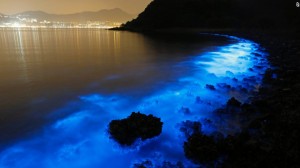-
Noctiluca algae is a parasite and occurs in patches or blooms in northern Arabian Sea.
-
Its bioluminescence characteristic i.e. glow in dark has earned it name ‘sea sparkle’.
-
The algae compete with fish for food and choke their supply.
-
It devours one of most important planktonic organisms at base of fish-food chain, namely diatoms.
-
It also excretes large amounts of ammonia, which causes massive fish mortality.
-
Scientists have found that global warming is driving proliferation of Noctiluca algae (commonly known as sea tinkle), a harmful algae in Arabian Sea responsible for glowing of Mumbai’s beaches in dark.

.png)

Impact of this Algae:
-
Warming of oceans due to global is increasing temperature differences among layers of sea water.
-
This temperature differences has slowed the upward transport of nutrients like silicate from ocean bottom, lowering its concentration at surface.
-
Diatoms growing in surface water which need both sunlight and silicate to build their glass skeletons, fail to thrive when silicate is in short supply.
-
On other hand, Noctiluca algae remain unaffected by these changes and prey on remaining diatoms.
-
Thus, the study shows that intensifying global warming conditions will disrupt fish-food chain and cause decline of fisheries in the region.